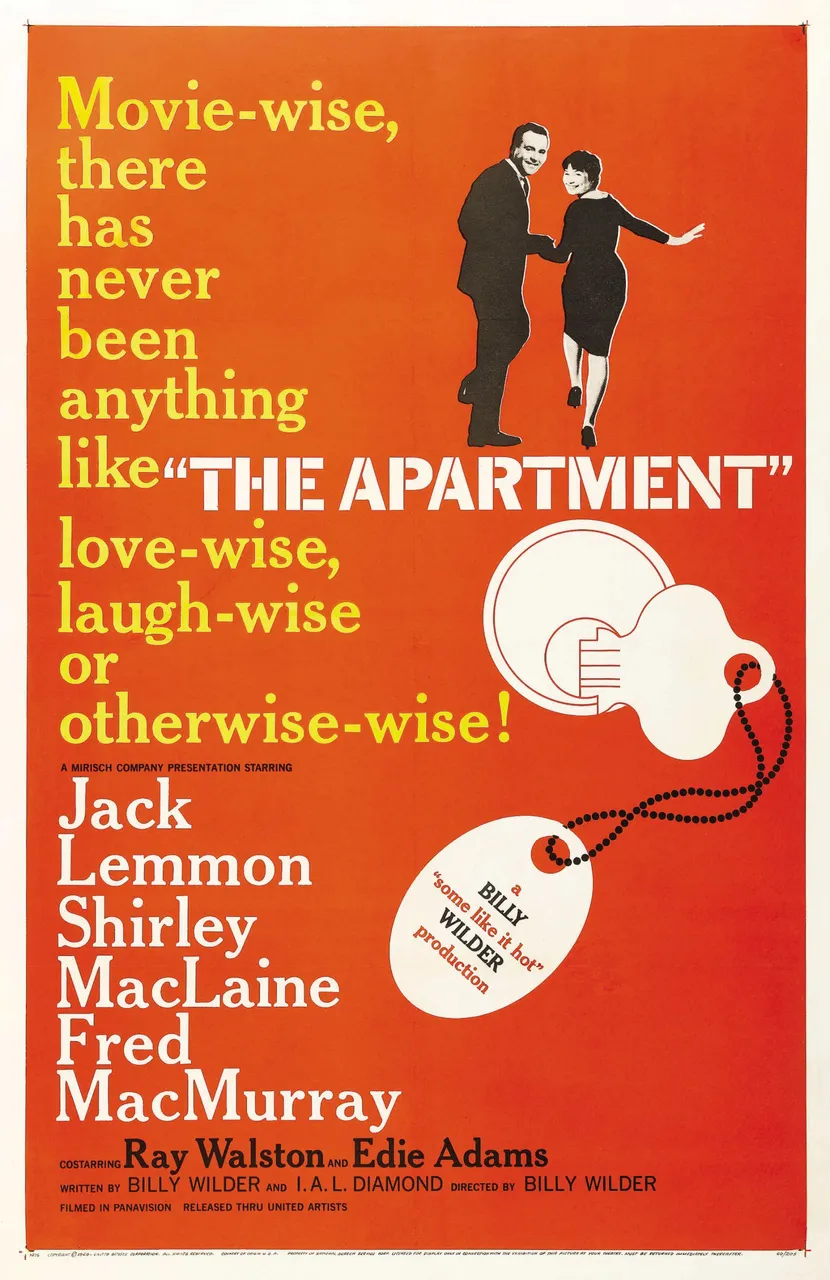
The Apartment is a 1960 American romantic comedy-drama film directed and produced by Billy Wilder, who also co-wrote the screenplay with I. A. L. Diamond. The film stars Jack Lemmon, Shirley MacLaine, Fred MacMurray, Ray Walston, Jack Kruschen, David Lewis, Willard Waterman, David White, Hope Holiday, and Edie Adams.
The film is a blend of comedy, drama, and satire, with sharp, witty dialogue and Jack Lemmon's hilarious mimic. It offers a realistic portrayal of life, avoiding clichéd scenarios of perfect love or utter hopelessness. The film has been praised for its honesty and ability to merge different moods without losing balance. The Apartment was well-received by critics and audiences alike, earning a total of $24.6 million at the box office
Plot
The film follows an insurance clerk named C.C. Baxter (Jack Lemmon) who, in the hope of climbing the corporate ladder, lets more senior coworkers use his Upper West Side apartment to conduct extramarital affairs.
He becomes attracted to an elevator operator named Fran Kubelik (Shirley MacLaine) in his office building, unaware that she is having an affair with his immediate boss, Mr. Sheldrake (Fred MacMurray). The story is a blend of comedy, drama, and satire, with sharp, witty dialogue and a realistic portrayal of life.
Trailer
Full Cast
- Jack Lemmon as C.C. Baxter
- Shirley MacLaine as Fran Kubelik
- Fred MacMurray as Jeff D. Sheldrake
- Ray Walston as Joe Dobisch
- Jack Kruschen as Dr. Dreyfuss
- David Lewis as Al Kirkeby
- Hope Holiday as Mrs. Margie MacDougall
- Joan Shawlee as Sylvia
- Naomi Stevens as Mrs. Mildred Dreyfuss
- Johnny Seven as Karl Matuschka
- Joyce Jameson as The Blonde
- Willard Waterman as Mr. Vanderhoff
- David White as Mr. Eichelberger
- Edie Adams as Miss Olsen
Director: Billy Wilder
Writer: Billy Wilder, I.A.L. Diamond
Box Office Gross: $18,778,738
Distributor: United Artists
Genre: Comedy, Drama
Release Date (Theaters): Jun 15, 1960
Release Date (Streaming): Mar 29, 2016
Themes & Reception
The film explores several themes and has received positive reviews from critics and audiences. Some of the main themes and aspects of the film include:
Sex: The film delves into the characters' personal lives and their relationships, focusing on the extramarital affairs of the main characters.
Loneliness and Alienation: The characters work in a corporate environment where they are defined by their positions and the amount of power they have in those positions. The film highlights the loneliness and alienation felt by the characters, particularly the main protagonist, C.C. Baxter (Jack Lemmon).
Betrayal: The film explores the betrayal of trust and the consequences of deception, as the characters navigate their relationships and careers.
Ambition: The story revolves around the protagonist's ambition to climb the corporate ladder, which leads him to make some questionable decisions.
The film has been praised for its honesty and ability to merge different moods without losing balance. The New York Times described The Apartment as a "warm, funny, and gently satirical film".
Variety noted that the film is "all Lemmon, with a strong twist of MacLaine" and that the actor uses comedy to evoke a range of emotions. The film's title theme, "Theme from The Apartment," composed by Charles Williams and originally titled "Jealous Lover," became a hit single later in 1960, reaching #10 on the Billboard Hot 100 chart.
Visual Styles & Techniques
The Apartment showcases a visual aesthetic that reflects Billy Wilder's directorial style. The film is presented in Cinemascope on black and white 35mm film, with an emphasis on a minimal attitude towards coverage and the use of subtle dolly work and strategic close-ups where the story demands it.
Wilder's approach to composition and cutting creates visual double entendres, utilizing props and set decoration to maximize the metaphoric capabilities inherent in the medium. The sets in the film are meticulously designed, providing a visually authentic portrayal of the era and capturing the essence of New York City.
Wilder's directorial style is evident throughout the film, with a focus on the use of chiaroscuro, employing light as a crucial storytelling tool, and employing swooping crane shots, smooth dollies, and high-velocity whip-pans to add visual flair.
The cinematography captures the essence of New York City, while the costume design accurately portrays the fashion trends of the early 1960s, adding an authentic touch to the film's visual aesthetics.
Setting
The Apartment is set in New York City, specifically in a corporate office building and the surrounding area. The film's setting plays a crucial role in the story, as it reflects the themes of loneliness, alienation, and the corporate environment.
The office setting highlights the characters' positions and the amount of power they have in those positions, as they work in equally spaced, uniform rows of desks with typewriters atop them.
Trivia
It is the first Best Picture Oscar winner to explicitly reference previous winners. The character Bud Baxter attempts to watch "Grand Hotel" (1932) on television but is delayed because of commercials.
Additionally, Bud's boss makes a comment about Bud and Fran having "a lost weekend," which is a direct reference to Billy Wilder's previous Oscar winner, "The Lost Weekend." It was also the only Best Picture nominee that year to be nominated for Best Original Screenplay. The film features references to other works by Billy Wilder, adding a layer of intertextuality to the narrative.
Fun Fact
One fun fact about The Apartment is that the concept of the film was inspired by real events and David Lean's "Brief Encounter." This interesting tidbit adds a layer of real-life inspiration to the film's narrative, showcasing the creative influences behind the story.